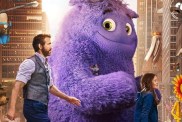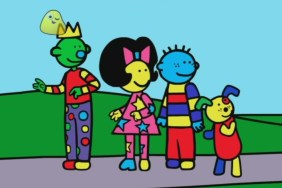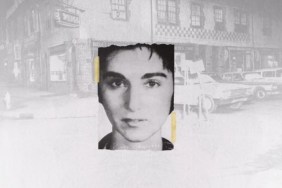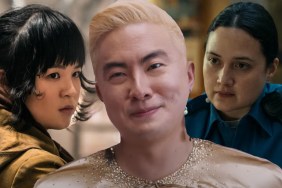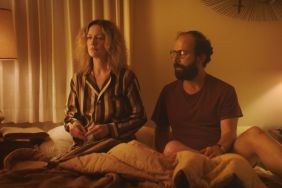Here at ComingSoon.net we get to talk to a lot of cool and talented filmmakers and actors, but every once in a while, we’re offered something that we can’t say “no” to, even if it’s not the usual movie-related junket or about a movie “coming soon.”
That’s exactly how we felt when we learned actress Sissy Spacek would be doing select interviews for her new memoir “My Extraordinary Ordinary Life” (published by Hyperion) which covers everything from her early childhood in Texas, through her fledgling music career and time spent in New York City, through her early movies Badlands and Carrie, her Oscar-winning role in the Loretta Lynn biopic Coal Miner’s Daughter, right through her role in last year’s major hit The Help.
During our interview, we touched upon a lot of different areas of her life, and we probably could have talked to her all day, since she has so many great stories about making movies during the Hollywood heyday of the ’70s with the likes Terrence Malick, Brian De Palma and David Lynch – the best man at her wedding to Badlands production designer Jack Fisk, to whom she’s still married today. She also has the most delightful natural Southern accent that’s probably been subdued for some of the roles she’s done, which makes her a joy to talk to.
ComingSoon.net: You’ve had an amazing life and it’s not a surprise you’d write a book about it, but what took you so long to write a book and what got you started on it?
Sissy Spacek: ‘Cause I was busy living it. (laughs) I come from a long line of storytellers, and there’s a long tradition of oral history in my family, so these stories, many of them were passed down and I wanted to make sure to get it down on paper while I can still remember so vividly.
CS: One thing I like about the book is that the title is very adapt. You talk about winning the Oscar for about a paragraph and then you’re back to talk about your pets…
Spacek: Kind of like people, isn’t it?
CS: Yeah, but I think you’d figure that “Coal Miner’s Daughter” would have three chapters about the whirlwind, but it’s really well mixed between your successful career and your family life, so was it hard to find that balance?
Spacek: Well, you know, originally I wanted to do a book about my childhood and just have the whole book about my childhood, but I found that my childhood so informed my adult life and my career, characters that I played, that I felt it was important to then write about the rest of my life.
CS: Even in the intro when you were talking about that scene from “Badlands,” and I started thinking about Terrence Malick’s latest movie “The Tree of Life” and it was such a personal movie for him and then I read about your childhood, and I thought you and Terence must have had an immediate bond.
Spacek: That’s how we connected. Those shared experiences that we had, our childhood, growing up in the same state, “the same neck of the woods” as they say, really bound us together. And I was so moved while I was watching “Tree of Life”… the DDT truck, even the little boy sneaking into the neighbor’s house – I had done all those things. Running down trails.
CS: My life was more suburban growing up in New England before moving to New York City, so reading about your smalltown Southern lifestyle was facinating. It’s interesting that you’ve gone back to the South with a lot of the movies you’ve done recently. You seem to be drawn back to that part of your life quite a bit.
Spacek: Yeah, it’s a comfort to me. It was important for me that my children have kind of a free-spirited childhood like that as well, so that was one of the reasons we went to Virginia.

CS: How long were you in New York for? Because it doesn’t seem like that long.
Spacek: I was here for about five or six years. Five and a half probably. (laughs)
CS: But you’ve been back here many times over the years.
Spacek: You know, New York gets under your skin, and I think once you’ve fallen in love with New York, you take that with you. I love New York. I still love it and come back often, and I never really felt like I left and I think you see that in the book. I write about Texas, New York, California and Virginia and they’re all important places in my repertoire. California, too, we were there, oh, about twelve or thirteen years, but when you work in film, those are just places. Those are mainstays, so I have roots there, but Virginia and Texas are just refuges for me.
CS: I found the different locales interesting for different reasons – Virginia and Texas because they’re not lifestyles I know, and New York interesting because I’ve been here so long…
Spacek: How long have you been here?
CS: I’ve been here 25 years now.
Spacek: See? It gets under your skin.
CS: But that wonder of coming to New York for the first time is so beautifully captured in your book. I want to ask about the music, because that was the reason you came to New York in the first place and it was such an important part of your life–and your daughter is obviousy a musician as well–so I was curious if you have gone back to it at all? Do you ever pick up a guitar and play anything?
Spacek: I do sing with her, and she gets me up on stage sometimes to sing harmonies with her, but music, I’m grateful for my love of music, because it’s that fearlessness of being able to play for anybody, when I first came to New York, it really opened doors for me, and I owe my film career to my fledgling music career that never really took off.
CS: What happened to all the songs you wrote? I read that you did a lot of writing in those days.
Spacek: They’re floating out there. You know, I wrote one with Michael Ritchie. When I first met him, he said, “Wow, so you’re a songwriter,” and I said, “Yes” and he said, “Well can you just write a song about anything?” and I said, “Yeah.” He looked over and he had ordered a drink and there was a maraschino cherry in it. “Anything? What about maraschino cherries?” I said, “Sure,” and he said, “Let’s write one.” This was my audition when I met him, so we wrote the “maraschino Red Blues,” which is one of my favorite songs that I ever wrote.
CS: It takes a lot of talents to be able to write songs like that, which is why I was so surprised you didn’t pursue it.
Spacek: My daughter is far more talented than me in the songwriting department, far more.
CS: Your ability to sing eventually led to “Coal Miner’s Daughter” in which you sang.
Spacek: That was the greatest thing ever, that I got to combine the two things I loved most – music and movies.
CS: That movie is very timely now beacuse Levon Helm just passed away, and many people may not remember that he had a key role in that movie.
Spacek: He was so great in it. He had never acted before, but he knew that man, he knew that character from the inside out. It was crazy. He’d say, “No I don’t think he’d do that, I think he’d do this” and he was always right. Tommy Lee Jones suggested Levon, and then Levon suggested Phyllis Boyens. Her father Nimrod Workman, they were both really reknowned mountain singers, and those three added so much authenticity to the film, and it gave us mountain clout. They knew how it should be, and they really grounded it. It would have been a different movie without them, and Phyllis and her father Nimrod and Levon are all gone.

CS: I’ve interviewed Michael Apted a number of times over the years.
Spacek: Isn’t he amazing?
CS: Absolulely. Having interviewed him and knowing him and his more recent movies, I just can’t picture him directing “Coal Miner’s Daughter,” because he’s so British.
Spacek: You know what, though? We were so lucky to get him. I was screening films–musical biopics–just to see what had been done and how they did it, and the common denominator between all those biopics was that the ones that were the best, the actors did their own singing and most of it was live. It just took the slickness away, it humanized it, and one fim we saw was “Payday” that Rip Torn did that was just a great performance, and then we saw of course “The Buddy Holly Story,” which was just great. That was live music, too, and then we screened a film called “Stardust” which Michael did, and not only did we love it, but there was such a grittiness and such a realistic quality to it that we decided that we should meet with Michael, and the thing I think was so briliant about Michael directing “Coal Miner’s Daughter” is that he didn’t have those preconceived country clichés–he just didn’t have them–and he came from a coal mining area in England, so he saw all of that with fresh eyes, so we were able to stay away from all those country clichés. Also, the way he sets up a shot and the way he shoots and the way he directs, I learned so much from him, and also the cinematographer, Ralf D. Bode–he’s passed away–but incredible. The two of them would just come in and we’d all talk about the scene, and then he’d make suggestions and he’d let the actors play the scene. Then he and Bode would watch the scene and they’d walk around and they would design the shot around the way the scene naturally played, rather than trying to fit the scene into a certain preconceived idea.
CS: David Cronenberg does that, too. I remember that was something I was really surprised to discover the first time I interviewed him.
Spacek: Cronenberg does it? It’s brilliant, beacuse sometimes an actor feels like, “You know, I need to go over there. I feel like I need to move on this line,” but you don’t know why, and it’s just an instinctual thing, and he would let us do that, and then so many other things come out of the moment that you don’t expect, because you’re in a comfortable, natural environment. You’re not thinking, “I have to stop here because I have to go over there now. I have to figure out how I’m going to get over there.” That’s part of his brilliance, Michael Apted.
CS: I wonder if Michael still shoots his movies that way.
Spacek: I’m sure he does. It’s very difficult when you don’t get to (work that way). There’s certainly other ways of being directed, but that’s just exciting.
CS: “Carrie” is still one of my favorite movies of yours. I was watching “Live with Kelly” yesterday when you were talking about it and the movie’s still very timely and it still works.
Spacek: Thank you, Brian De Palma. People go, “Oh my God, that was so scary” but realy, it was scary like “Boo!” At the end when the arm comes out, but there’s so much humor in it. It was just one of those serendipitous things with everybody that worked on that, everbody that Brian brought together, brought something to it. He had a real handle on it and he knew what he wanted. Now, he does a lot of storyboarding, Brian, and what I loved about the way he works is that he would let me do anything I wanted within a parameter. He’d set up the shot a certain way and I’d say, “Can I do this?” “Yeah.” So he knew what he needed, knew what he wanted and beyond that, we had an amazing freedom. Probably for me, “Carrie” had one of the most scenes, the scene in the kitchen where Piper Laurie is struck with all those kitchen utensils. It’s so scary, it’s so horrifying, but it’s ridiculous. I love it, I just love that, and that was back in the old days when they came OUT on wires and then they reversed the film, but boy….
You can hear what Spacek had to say about the upcoming Carrie remake and its stars by clicking here.

CS: Reading your book has really made me want to rewatch a lot of those movies, especially when you talk about “Badlands” and other movies that were really very low budget. I talk to a lot of people making indie films where it was all hands on deck.
Spacek: Everybody does everything. There’s no “This is my department. I can’t crossover.”
CS: It’s amazing to hear that all of these classic movies were made in that way.
Spacek: The beauty of that is that it doesn’t cost that much money and nobody cares, because there’s not a lot of risk, so you really get the creative process, because there isn’t much money and you have to be more creative. There’s not as many rules, and it’s really a wonderful way to work, and that’s how we did things in the ’70s. Of course, it’s sometimes nice to have a motor home, it’s nice to have a caterer. (laughs)
CS: I’m really amazed by the amount of people you’ve kept in your life from your early days making movies, including David Lynch, which doesn’t seem very common these days.
Spacek: I think the movie business, you meet people and you work intensely with them and you have these relationships – there’s an intimacy to it and a familiarity to the relationship because you’re having to let go of all your barriers so you can let people in and work with them. That’s a really beautiful thing but then you go off to work on other films an they go off, and that’s why all these events, like the Golden Globes and the Academy Awards… when there’s a commercial, everybody’s getting up and running over to see the people that they worked with over the years, so there is great camaraderie, but people have children, but you know how when you get to be an adult, it’s like patting your head and rubbing your stomach, and you’re them man with all the plates in the air. But David (Lynch) was my husband Jack’s best friend since high school 9th grade, so their friendship was beyond just working. I’ve made a lot of friends in the movie business and before. I’m still friends with all the roommates that I had, who I’m all seeing this week.
CS: What’s next for you? I know you had a movie that just at Tribeca (“Deadfall”), which I haven’t seen yet.
Spacek: I haven’t seen it either. You know, this took me a year plus the rest of my early part of my life. (laughs) It took me my whole life to write this book. So I took time off to do that, so I don’t know what I’m doing next. I have films that are different stages in development, but nothing really that I know I’m going to do next or have a start date. I think I’m actually going to relax over the summer and hold the fort down. Jack is making some films with Terry… (Note: That’s Terrence Malick, who her husband Jack Fisk has done production design for al his movies.)
CS: A lot of films I hear.
Spacek: I’m always excited. He works a lot with Terry, of course, and with Paul Thomas Anderson and with David, so that’s always great, but I don’t have my production designer at home. (Laughs)
Sissy Spacek’s memoir “My Extraordinary Ordinary Life” is available now from most reputable booksellers both online and off.


